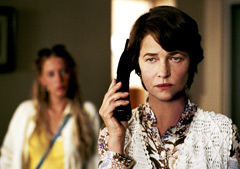|
Swimming Pool
|
| |
 |
France/UK, 2003. Rated R. 102 minutes.
Cast:
Charlotte Rampling, Ludivine Sagnier, Charles Dance, Marc Fayolle, Jean-Marie
Lamour, Mireille Moussé, Michel Fau, Jean-Claude Lecas
Writers: Emmanuèle Bernheim, François Ozon
Music: Philippe Rombi
Cinematographer: Yorick Le Saux
Producers: Olivier Delbosc, Marc Missonnier
Director: François Ozon
LINKS
|
Read the AboutFilm
feature and interview with Ludivine Sagnier.
 rançois
Ozon is a cold director. 8 Women was
supposed to be a campy ode to the musicals of the 1950s, but the fun was too
often blocked by Ozon's remote, chilly attitude toward his women. His critically
acclaimed Under the Sand was also a frigid film whose isolated protagonist,
ostensibly unable to accept the disappearance of her husband, outwardly appears
to be coping with reality while she engages in odd behavior that is progressively
more difficult to explain. Though admirably played by Charlotte Rampling, the
character as written fails utterly to connect with the audience. As a character
portrait, it was irritatingly hazy. As a story, it was an irritatingly hazy
character portrait.
rançois
Ozon is a cold director. 8 Women was
supposed to be a campy ode to the musicals of the 1950s, but the fun was too
often blocked by Ozon's remote, chilly attitude toward his women. His critically
acclaimed Under the Sand was also a frigid film whose isolated protagonist,
ostensibly unable to accept the disappearance of her husband, outwardly appears
to be coping with reality while she engages in odd behavior that is progressively
more difficult to explain. Though admirably played by Charlotte Rampling, the
character as written fails utterly to connect with the audience. As a character
portrait, it was irritatingly hazy. As a story, it was an irritatingly hazy
character portrait.
A dispassionate directorial style, where all action is framed against a stark
landscape and there exists not the slightest hint of overstatement, can be effective,
but only if the material is extremely compelling. That requires not only superb
actors (which 8 Women and Under the Sand did have), but also a
sharp, evocative screenplay. Unlike Ozon's two previous efforts, Swimming
Pool offers the latter. Ozon's directorial style has not changed, but now
it works.
Focusing on another internally troubled woman played by Charlotte Rampling,
Swimming Pool has a far more ambiguous and complex story structure than
Under the Sand, but it is less inscrutable, suggesting various possible
meanings and explanations. Swimming Pool is also, like so many movies
today, in part a film about writing. Writers writing about writing—it's
a trend.
The writer in this case is Englishwoman Sarah Morton (Rampling), author of
a series of best-selling mystery novels that bear titles like Inspector Dorwell
Wears a Kilt. Bitter and burnt out, she longs to write about something more
profound than murders and investigations. Her commercially minded publisher
John Bosload (Charles Dance), with whom Sarah may or may not have a romantic
relationship, sends her to his vacation home in the  South
of France to recuperate and recharge. The English are always going to the South
of France or the hills of Italy to embark on journeys of self-discovery, it
seems. Sarah is no different.
South
of France to recuperate and recharge. The English are always going to the South
of France or the hills of Italy to embark on journeys of self-discovery, it
seems. Sarah is no different.
Sarah visibly relaxes as soon as she arrives. She settles into Bosload's spacious
country home and the tiny village of Lubéron, yet maintains some distance from
her surroundings. She leaves the swimming pool covered and avoids the local
food, buying only junk and subsisting mostly on yogurt and tomatoes. "I don't
need anyone, you know," she tells her aged father on the telephone. But Sarah
does get someone. Her tranquility is shattered by the arrival of Bosload's boisterous,
clothing-optional French daughter Julie (Ludivine Sagnier, now an Ozon regular).
They are instantly at odds. Sarah likes to have total peace, quiet, and cleanliness;
Julie likes to smoke, drink, and screw a different man every night. Middle aged,
pasty bodies, stringy hair—it makes no difference to Julie. She assumes
Sarah is "daddy's latest conquest."
One might expect an angry Sarah to flee, but she does not. At first she tries
to shut Julie out, but this proves impossible. Instead Sarah finds herself drawn
to Julie. She steals Julie's much more flavorful food, spies on her having sex,
and eventually discovers her journal. Sarah's curiosity becomes insatiable as
reality and her creative process collide. A story idea has taken hold, and Julie
is the inspiration.
While mostly antagonistic, the interplay between Sarah and Julie reveals much
about their needs and desires, and how each woman is damaged. Amid the squabbling,
an unpredictable bond forms. About the only development that can be easily guessed
is that Julie will inevitably discover that Sarah has been at her diary. She
does so in a sublimely acted moment of shock in which Sagnier suddenly looks
five years younger and more naked than when she has her clothes off. Another
excellent scene is when Julie brings home Franck (Jean-Marie Lamour), a local
waiter to whom both Julie and Sarah are attracted, and prevails upon Sarah to
dance. Sarah finally does so, awkwardly hippity-hopping up and down with absolutely
no rhythm, but slowly getting a feel for the beat as Franck draws closer.
As in 8 Women, Ozon displays an affection for primary colors and stark
contrasts—a couple shots of a bright red raft floating on the turquoise
pool, for example, which are mirrored by a couple shots of Sarah's bed, covered
by a bright red bedspread against the backdrop of a rich azure wall. He sprinkles
in a number of easily spotted visual symbols—the appearing and disappearing
cross on Sarah's wall, the scar extending vertically from Julie's bellybutton,
a small egg (to represent Sarah's story idea), and, of course, the pool itself,
sometimes covered, sometimes uncovered, sometimes dirty, sometimes clean. The
pool both reflects reality and provides an entrance to a different one. As Ozon
remarks, "It takes a long time before Sarah Morton gets into the swimming pool.
She can do it only when Julie becomes her inspiration, and only when the pool
is finally clean." As Julie's influence forces Sarah to face her own desires,
we see Sarah in poses and situations that are exact copies of previous scenes
involving Julie. Everything is carefully framed; there is not a single casual
shot in the film.
Bosload observes to Sarah that writing about feelings is not her strong suit.
That may have been true of Ozon in past films as well, but Swimming Pool
is surprisingly deep. Ozon does not even allow us to see how deep until the
final scene is over, giving us that special fun that only the very best movies
provide—the pleasure of diving in again and again.
Review
© June 2003 by AboutFilm.Com and the author.
Images © 2003 Focus Features. All Rights Reserved.

 South
of France to recuperate and recharge. The English are always going to the South
of France or the hills of Italy to embark on journeys of self-discovery, it
seems. Sarah is no different.
South
of France to recuperate and recharge. The English are always going to the South
of France or the hills of Italy to embark on journeys of self-discovery, it
seems. Sarah is no different.
